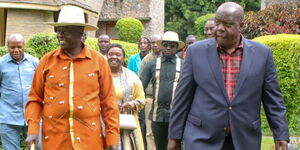President William Ruto has been challenged to repeal the Computer Misuse and Cybercrimes (Amendment) Act 2024, which he signed into law on the day former Prime Minister Raila Odinga died.
In an X post on Monday, October 20, lawyer Miguna Miguna questioned whether Ruto will recall the new legislation amid reports that it had triggered renewed calls for anti-government protests.
The lawyer’s sentiments added to the growing debate surrounding the law, which was signed into law together with seven other Bills that have also sparked heightened scrutiny on the government.
The timing and manner of assent, on the day of Raila’s passing, raised suspicions among observers about transparency and public awareness.
“Will William Ruto recall the Cyber Crime Act and other offensive legislation he hurriedly signed into law before announcing Raila Odinga’s death, or does he want to force Kenyans back to the streets?” Miguna posited.
Critics have argued that the new law appears less about regulating genuine cybercrime and more about political control and monitoring of online spaces.
This is particularly after several provisions of the law give the government powers to block websites or apps, remove content, or shut down digital platforms, which has raised alarm that the law could be used to stifle dissent, investigative journalism and legitimate online expression.
Also, the definitions used in the law, such as ‘likely to cause fear or violence’, ‘grossly offensive’, ‘promote illegal activities’, ‘extremist religious or cultic practices’, are criticised as being vague and open to broad interpretation, giving government wide discretion.
Further, the very high jail terms and fines have raised eyebrows on fairness and Kenya’s commitment on digital rights.
For example, the penalty for cyber harassment, which is defined as communication that an individual knows or ought to know could cause emotional, reputational, safety or property harm, is a fine of up to Ksh20 million, imprisonment for up to 10 years, or both.
Other Bills assented into law by Ruto on October 15 were the Privatisation Bill (2025), National Land Commission (Amendment) Bill, 2023, Land (Amendment) Bill 2024, Virtual Asset Service Providers Bill, 2025, Air Passenger Service Charge (Amendment) Bill, 2025, Wildlife Conservation & Management (Amendment) Bill, 2024, and the National Police Service Commission (Amendment) Bill, 2024.
Miguna also raised questions about the number of Kenyans who lost their lives during the public viewing of Raila at Kasarani Stadium and whether those responsible will be held accountable.
Raila passed away aged 80 after suffering a cardiac arrest in India, where he had gone to seek treatment. After his passing, Ruto declared seven days of national mourning and accorded him a State Funeral, complete with military honours.
However, Raila’s body viewing, part of the provisions of a State Funeral, was marred by chaos, with police lobbing tear gas and firing gun shots on Thursday, as a sea of mourners flocked Kasarani stadium to have a chance of viewing his body.
Raila was laid to rest on Sunday, October 19, at the Kang’o ka Jaramogi homestead, a few metres from his late father, Jaramogi Oginga Odinga's mausoleum.












